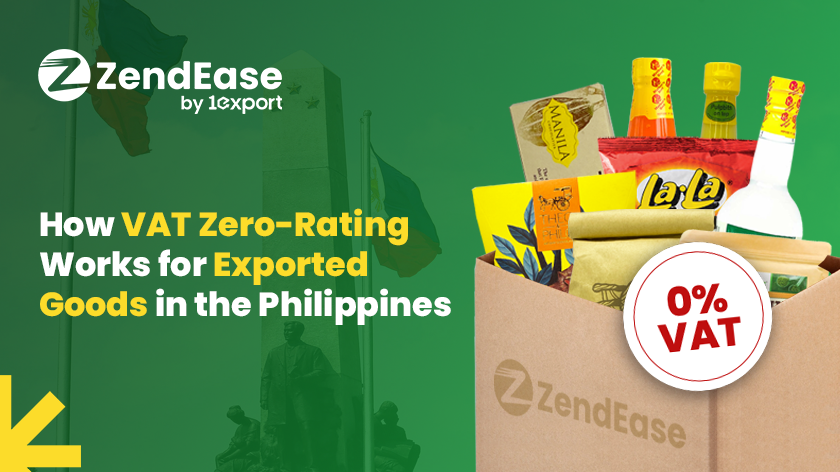How VAT Zero-Rating Works for Exported Goods in the Philippines
Philippine VAT Zero-Rating Explained for Export Businesses
by Jennifer Victoria Garrucho on Sep 16, 2025

If you’re a Philippine SME selling goods abroad, you may have heard the term VAT zero-rating and wondered what it means for your business. Is it a tax exemption? How does it work? And most importantly, how can you benefit from it without running into compliance issues?
This guide will walk you through the basics of VAT zero-rating for exported goods in the Philippines, using simple explanations that allow you to focus on growing your business internationally.
What Is VAT Zero-Rating?
Before diving into the details of eligibility or requirements, it’s essential to first understand what VAT zero-rating actually means. Many exporters confuse it with tax exemptions — but the two are different.
VAT zero-rating means that your sale is still considered a VAT-taxable transaction, but the VAT rate applied is 0%. In the Philippines, this rule applies to certain goods and services that are sold to foreign customers or delivered outside the country.
Here’s what it means for you:
- You don’t charge VAT on qualifying sales to overseas buyers.
- You can still claim input VAT credits from your purchases related to those sales.
This helps your business remain competitive in global markets while ensuring compliance with tax regulations.
Who Qualifies for VAT Zero-Rating?
Now that you know what VAT zero-rating is, the next question is: who qualifies? The Bureau of Internal Revenue (BIR) sets specific criteria that businesses must meet.
Your business may qualify if:
- You are a VAT-registered business in the Philippines.
- Your goods are physically shipped out of the country to a foreign buyer.
- You can prove the sale and shipment through proper export documentation (covered in detail below).
Examples of businesses that often qualify:
- Manufacturers producing goods for foreign clients
- Wholesalers supplying products to overseas distributors
- E-commerce sellers shipping directly to international customers
Meeting the eligibility requirements is key, and SMEs should always double-check their status before applying VAT zero-rating to transactions. ZendEase can support your business by reviewing export documentation and guiding you on compliance — helping you avoid costly mistakes.
Examples of VAT Zero-Rated Goods
To better understand VAT zero-rating in practice, it helps to look at common categories of goods that the BIR may consider eligible.
Common examples include:
- Locally manufactured goods shipped abroad
- Raw materials are sold to export-oriented enterprises registered with investment promotion agencies
- Goods purchased by foreign embassies or international organizations (if allowed under special laws or agreements)
The rules can change depending on government regulations — so it’s best to confirm with the BIR before assuming your product qualifies.
Documentary Requirements and Compliance Steps
Even if your business and goods qualify, VAT zero-rating usually requires supporting paperwork to show proof of eligibility. Many SMEs find this step overwhelming, but knowing the required documents makes the process more manageable.
Claiming VAT zero-rating requires documents such as:
- Export invoices and packing lists
- Bill of lading or airway bill
- Export declaration from the Bureau of Customs
- Proof of payment from the foreign buyer
- BIR application forms
Having all documents ready not only speeds up the process — it also reduces the risk of delays or penalties from the BIR. This is where ZendEase adds value by assisting your business with export paperwork and ensuring documentation is complete and accurate — giving you peace of mind throughout the compliance process.
How to Apply VAT Zero-Rating to Your Business
Having the proper documents is only part of the process. To actually benefit from VAT zero-rating, you need to follow the correct steps in applying and maintaining compliance. For SMEs, this may sound complicated, but it can be broken down into clear, actionable stages:
- Register for VAT with the BIR if you haven’t already done so.
- Confirm eligibility for VAT zero-rating based on your export transactions.
- Prepare complete export documentation for every shipment.
- File applications or reports required by the BIR within the deadlines.
- Maintain organized records to back up your VAT zero-rating claims.
Why VAT Zero-Rating Matters for SMEs
With the process outlined, the next question is: why should SMEs prioritize VAT zero-rating? Beyond compliance, it directly impacts your profitability and competitiveness in global markets.
VAT zero-rating provides a pricing advantage while enabling you to recover VAT on local expenses. For SMEs, that can mean:
- Offering lower prices to attract international buyers
- Improved cash flow from input VAT refunds
- Enhanced market position when competing with global products
Get Expert Support from ZendEase
Navigating VAT zero-rating rules can be overwhelming for SMEs — especially when regulations often change or paperwork piles up. While the BIR is the final authority, having the right support makes the process far easier.
If you want to maximize your export profits while staying compliant with VAT rules, ZendEase can guide you through the paperwork, eligibility requirements, and coordination with government agencies.
You can also visit us at 104 V.A. Rufino Street, Makati, for in-person assistance and consultations on VAT zero-rating and other export requirements.
Book your consultation today and let ZendEase help you ship smarter, save more, and grow faster in the global market.